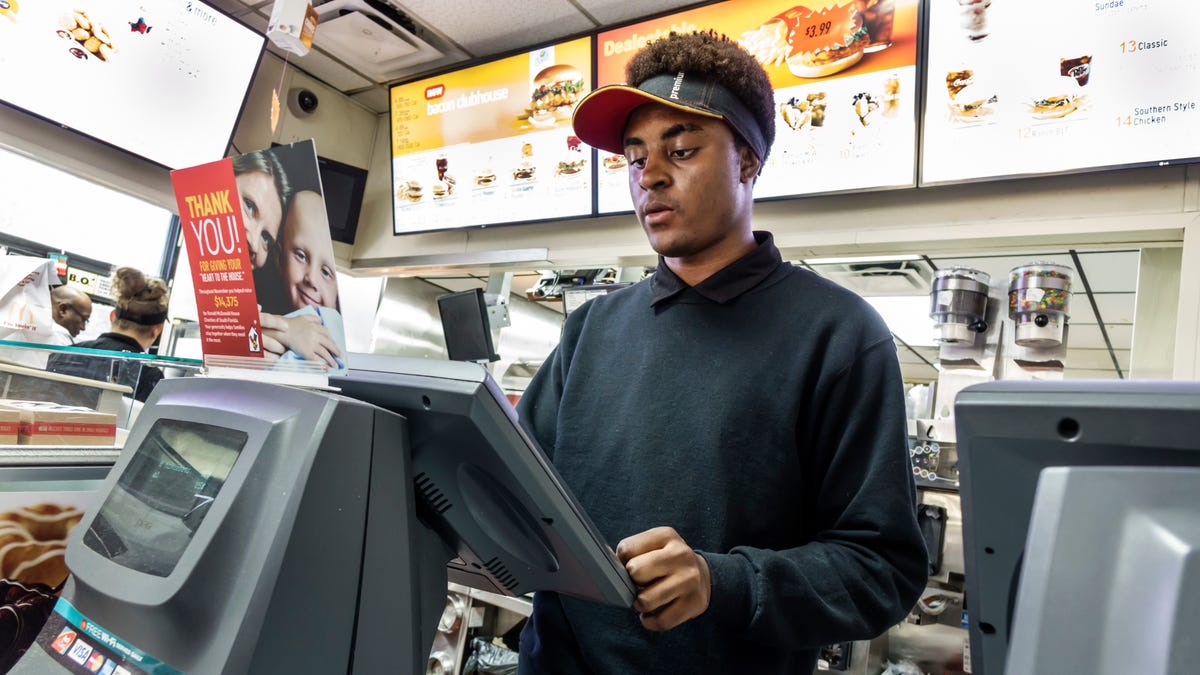In the bustling world of fast food, a myriad of opportunities await. Fast food jobs offer a dynamic and ever-evolving landscape, where individuals can embark on rewarding careers while serving up delicious meals to hungry customers.
From entry-level positions to management roles, the fast food industry provides a diverse range of job opportunities. This comprehensive guide delves into the intricacies of fast food jobs, exploring the various job roles, hiring processes, training programs, employee benefits, workplace culture, and emerging trends shaping the future of this vibrant industry.
Training and Development
:max_bytes(150000):strip_icc()/fast-food-worker-525694-Final-96a1a4922126415185bbba2a2c998a30.png)
Fast food companies invest heavily in training and development programs to ensure their employees are equipped with the skills and knowledge to perform their jobs effectively. These programs typically include a combination of on-the-job training and classroom instruction.On-the-job training involves working under the supervision of an experienced employee who provides guidance and feedback.
This type of training is essential for developing the practical skills necessary to succeed in a fast-paced environment. Classroom instruction provides employees with the theoretical knowledge they need to understand the principles of food safety, customer service, and other aspects of their job.
Fast food jobs can be a great way to get your foot in the door of the food industry, but if you’re looking for something with a little more freedom and flexibility, you might want to consider starting your own food business.
One option is to purchase a food trailer for sale . This is a great way to get started in the food industry without having to invest in a brick-and-mortar location. You can also use your food trailer to cater events or to sell food at local markets.
Fast food jobs can be a great way to learn the ropes of the food industry, but if you’re ready for something more, consider starting your own food business with a food trailer.
Career Advancement Opportunities
Many fast food companies offer career advancement opportunities for employees who demonstrate a strong work ethic and commitment to the company. These opportunities may include promotions to management positions or opportunities to work in different departments within the company. Some companies also offer tuition reimbursement programs to help employees pursue higher education.
Successful Training Initiatives, Fast food jobs
One example of a successful training initiative in the fast food industry is McDonald’s Hamburger University. This program provides employees with a comprehensive training experience that includes both on-the-job training and classroom instruction. Graduates of Hamburger University have gone on to become successful managers and executives within the McDonald’s system.
Employee Benefits and Compensation
Working in the fast food industry offers a range of employee benefits and compensation packages that vary depending on the company, location, and job role.
Common benefits include:
- Health insurance
- Dental insurance
- Vision insurance
- Paid time off
- Employee discounts
- Flexible scheduling
Compensation Packages
Compensation packages typically include a combination of hourly wages, tips, and bonuses. Factors influencing salary levels include:
- Job experience
- Education level
- Location
- Company size
According to the U.S. Bureau of Labor Statistics, the median hourly wage for fast food workers in May 2023 was $13.68. However, wages can vary significantly depending on the factors mentioned above.
Table of Benefits and Compensation Structures
| Benefit | Compensation Structure ||—|—|| Health insurance | Hourly wages, tips, bonuses || Dental insurance | Hourly wages, tips, bonuses || Vision insurance | Hourly wages, tips, bonuses || Paid time off | Hourly wages, tips, bonuses || Employee discounts | Hourly wages, tips, bonuses || Flexible scheduling | Hourly wages, tips, bonuses |
Workplace Environment and Culture: Fast Food Jobs

The workplace environment in fast food restaurants is fast-paced, demanding, and often stressful. Employees are expected to work quickly and efficiently, often in a hot and noisy environment. They may also have to deal with rude or impatient customers.
However, working in the fast food industry also offers some unique challenges and opportunities. Employees can learn valuable skills such as teamwork, customer service, and time management. They may also have the opportunity to advance to management positions.
Company Culture and Values
The company culture and values of major fast food chains vary widely. Some chains, such as McDonald’s, are known for their strict adherence to rules and procedures. Others, such as Chipotle, are more focused on creativity and innovation.
It is important for employees to find a fast food chain that aligns with their own values and work style. This will help them to be more successful and satisfied in their jobs.
Technology and Innovation

Technology has revolutionized the fast food industry, transforming job roles and improving efficiency. From automated ordering systems to kitchen automation, technology is enhancing the customer experience and streamlining operations.
Job Role Transformation
Self-service kiosks and mobile ordering apps allow customers to place orders directly, reducing the need for cashiers. Kitchen automation systems, such as robotic fryers and automated beverage dispensers, assist cooks in preparing food faster and more consistently. These technologies empower employees to focus on higher-value tasks, such as customer service and quality control.
Efficiency Improvements
Inventory management systems track food and beverage stock levels in real-time, optimizing ordering and reducing waste. Predictive analytics helps forecast demand, enabling restaurants to staff appropriately and avoid over or understaffing. Cloud-based POS systems streamline data collection and analysis, providing valuable insights into customer behavior and sales trends.
Innovative Technologies
Fast food companies are investing in cutting-edge technologies to enhance their operations:
- AI-powered voice assistantsenable customers to place orders hands-free, reducing wait times.
- Smart sensorsmonitor equipment performance and predict maintenance needs, minimizing downtime.
- Facial recognition technologypersonalizes the customer experience and speeds up the ordering process.
Future Trends and Outlook
The fast food industry is constantly evolving, and several emerging trends will shape its future. Automation, changing consumer preferences, and industry consolidation are key factors that will impact fast food jobs.
Automation
Automation is already playing a significant role in the fast food industry, and its impact is only expected to grow in the future. Automated kiosks, self-service ordering, and food preparation machines are becoming increasingly common, reducing the need for human workers.
While automation can improve efficiency and reduce costs, it also raises concerns about job displacement.
Changing Consumer Preferences
Consumer preferences are also changing the fast food landscape. Health-conscious consumers are demanding healthier options, while convenience-seeking consumers are looking for fast and easy meals. Fast food restaurants are responding to these changing preferences by offering more plant-based and low-calorie options, as well as mobile ordering and delivery services.
Industry Consolidation
The fast food industry is also undergoing a period of consolidation, with large chains acquiring smaller ones. This consolidation is driven by the need to increase market share and reduce costs. As a result, the industry is becoming increasingly concentrated, with a few large players controlling a majority of the market.
Predictions for the Future
Based on these trends, several predictions can be made about the future of the fast food job market:
- Automation will continue to displace jobs, but it will also create new opportunities in areas such as maintenance and repair.
- Fast food restaurants will continue to offer more healthy and convenient options to meet changing consumer preferences.
- The industry will continue to consolidate, with a few large chains dominating the market.
- Fast food workers will need to develop new skills, such as technology proficiency and customer service, to remain competitive.
Closure
As the fast food industry continues to evolve, so too will the opportunities it presents. By embracing innovation, adapting to changing consumer preferences, and investing in employee development, fast food companies can continue to thrive in the years to come.
And for those seeking a dynamic and rewarding career, the fast food industry offers a wealth of possibilities to explore.


